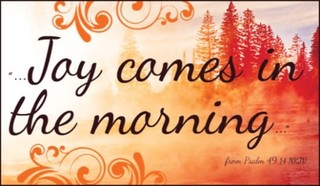
- Recent Translations
- All Translations
Psalm 30 Commentary
Chapter 30
Praise to God for deliverance. (1-5) Others encouraged by his example. (6-12)
1-5. The great things the Lord has done for us, both by his providence and by his grace, bind us in gratitude to do all we can to advance his kingdom among men, though the most we can do is but little. God's saints in heaven sing to him; why should not those on earth do the same? Not one of all God's perfections carries in it more terror to the wicked, or more comfort to the godly, than his holiness. It is a good sign that we are in some measure partakers of his holiness, if we can heartily rejoice at the remembrance of it. Our happiness is bound up in the Divine favour; if we have that, we have enough, whatever else we want; but as long as God's anger continues, so long the saints' weeping continues.
Verses 6-12 When things are well with us, we are very apt to think that they will always be so. When we see our mistake, it becomes us to think with shame upon our carnal security as our folly. If God hide his face, a good man is troubled, though no other calamity befal him. But if God, in wisdom and justice, turn from us, it will be the greatest folly if we turn from him. No; let us learn to pray in the dark. The sanctified spirit, which returns to God, shall praise him, shall be still praising him; but the services of God's house cannot be performed by the dust; it cannot praise him; there is none of that device or working in the grave, for it is the land of silence. We ask aright for life, when we do so that we may live to praise him. In due time God delivered the psalmist out of his troubles. Our tongue is our glory, and never more so than when employed in praising God. He would persevere to the end in praise, hoping that he should shortly be where this would be the everlasting work. But let all beware of carnal security. Neither outward prosperity, nor inward peace, here, are sure and lasting. The Lord, in his favour, has fixed the believer's safety firm as the deep-rooted mountains, but he must expect to meet with temptations and afflictions. When we grow careless, we fall into sin, the Lord hides his face, our comforts droop, and troubles assail us.
Psalm 30 Commentaries
Chapter Summary
INTRODUCTION TO PSALM 30
\\<>\\. This is the first time that a psalm is called a song; some psalms are called by one name, some by another, and some by both, as here; and some are called hymns: to which distinction of them the apostle refers in Eph 5:19. A psalm was sung upon musical instruments, a song with the voice; it may be this psalm was sung both ways: the occasion of it was the dedication of David's house: the Targum interprets it of the house of the sanctuary, the temple; and so most of the Jewish commentators {i}; which might be called his house, because it was his intention to build it; his heart was set upon it, he provided materials for it, and gave his son Solomon the form of it, and a charge to build it; and, as is thought, composed this psalm to be sung, and which was sung by the Levites at the dedication of it: others, as Aben Ezra, are of opinion it was his own dwelling house, made of cedar, which he dedicated according to the law of Moses, with sacrifices and offerings, prayer and thanksgiving, \2Sa 5:11 7:2 De 20:5\; so Apollinarius calls it a new house David built; but since there is nothing in the whole psalm that agrees with the dedication, either of the temple, or of David's own private house, it seems better, with other interpreters, to understand it of the purging of David's house from the wickedness and incest of his son Absalom, upon his return to it, when the rebellion raised by him was extinguished; which might be reckoned a new dedication of it; see 2Sa 20:3; and to a deliverance from such troubles this psalm well agrees. Theodoret interprets it of the restoration of the human nature by Christ, through his resurrection from the dead. {i} Jarchi, Kimchi, & Abdendana.

